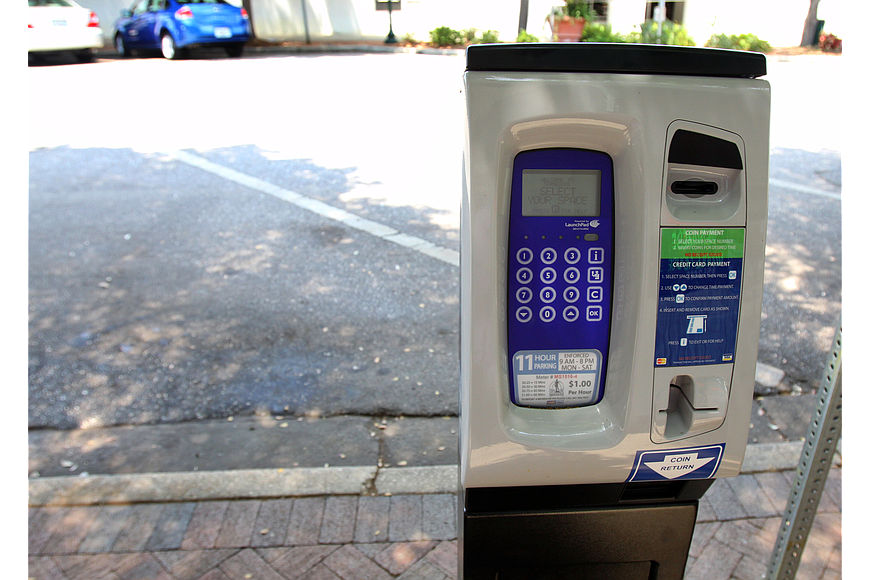- April 25, 2024
-
-
Loading

Loading

A group of downtown merchants attended today’s City Commission meeting looking for assurance officials weren’t considering placing parking meters on Main Street in the near future.
They didn’t get it.
Instead, they got no clear answer on the city’s downtown parking philosophy from a divided commission. The majority of the board offered distaste for the prospect of bringing back meters after failed efforts to implement paid parking systems in the past.
At the same time, a majority of the board also expressed a desire to address a longstanding deficit in the city’s parking fund. In the past three years, the city has spent $1.57 million from its general fund to subsidize parking operations.
These potentially clashing perspectives — which different configurations of at least three commissioners vocalized today — make it difficult to assess whether the City Commission will approve a metered parking system downtown. The board directed staff to gather additional information on the effects of parking meters for a future discussion.
In 2016, the City Commission approved a comprehensive parking strategy that included a recommendation to install meters downtown. Parking Manager Mark Lyons worked with a citizen advisory committee to produce a 73-page report detailing recommendations for managing parking in the city.
The document identified on-street paid parking as a solution for addressing the parking deficit and for encouraging more turnover in busy commercial districts.
“We have to manage the spaces, manage the behaviors of people parking downtown so it benefits our businesses and people who want to park,” Lyons said at the time.
As the city searches for a vendor to provide parking meters, City Commissioner Hagen Brody placed a discussion item on the agenda for today’s meeting. Elected after the city adopted the new parking strategy, Brody hoped to direct staff to halt the implementation of downtown parking meters unless the commission voted otherwise.
Although staff already had to return to the commission for final approval before purchasing and installing parking meters, Brody was hoping to send a message to downtown business owners and other residents who have opposed the proposal.
“I think we need to be clear to the public: At this time, it’s not going to be implemented downtown,” Brody said.
Eleven individuals, mostly downtown business representatives, spoke against the idea of installing meters downtown. Those speakers were concerned about the meters hurting business and about customers being unable to use the meters. They encouraged the city to consider alternative solutions for addressing budgetary concerns — and to abandon consideration of parking meters.
“It unsettles the merchants and the customers,” said Chip Beeman, owner of Pastry Art and Main Bar.
City Manager Tom Barwin offered a defense for staff’s recommendation to install parking meters. He said it was a common practice in cities across the country, and compared meters to water and waste utilities that charge individuals based on their use of a municipal service.
He said staff is focused on finding user-friendly meters. He also underscored the need to prevent the parking deficit from growing unabated, particularly as the city builds more parking garages.
“I have a fiduciary responsibility to you and our community to let you know we have a deficit situation in the parking fund,” Barwin said. “I expect that situation will continue unless we figure out how to address it.”
Brody and Mayor Shelli Freeland Eddie remained opposed to the idea that installing parking meters was the best way to address the issue. Commissioner Jen Ahearn-Koch said she has “never been for parking meters,” but wanted to work with staff to explore options for generating revenue to eliminate the deficit.
“We do need to have a solution,” Ahearn-Koch said. “Part of the discussion needs to be: If not meters, how do we implement a paid parking system that will pay for itself?”
Since the city formed a Parking Advisory Committee in 2012, Barwin said staff has not identified another viable option for sufficiently increasing parking revenues. He pointed out that, under staff’s plans, any excess revenue metered parking generates would get reinvested into the district where the meters are installed.
It is unclear when staff intends to return to the commission to present additional information regarding parking meters. Last month, Lyons said he hoped the city could begin phasing in meters downtown in early summer 2018.
Lyons was not present for today’s discussion. His City Hall voicemail said he was out of the office until Wednesday.